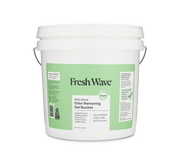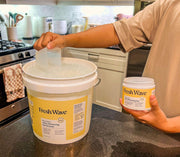Foul odors can make it difficult to relax in your home and complete daily tasks. What’s more, many bad odors can be an indication of a serious underlying problem that could threaten your family’s health and safety. In this post, we’ll break down some of the most common sources of odors, so you know where to check when there is a weird smell in your house.
Common Causes of Bad Odors in a Home
Odors happen when molecules from certain substances enter the air. Some common culprits include:
- Bacteria:Some strains of bacteria give off foul-smelling compounds when breaking down organic matter like food waste.
- Fungus: Molds and mildew emit volatile organic compounds and are often the cause when a house smells musty.
- Food: As it spoils, food stinks largely due to the presence of bacteria, mold and yeast. When you cook, compounds from strong-smelling foods like fish and garlic enter the air and cause odors.
- Human waste: Problems with plumbing can cause waste or gases to back up, causing odors.
- Pets: Sweat and bacteria that linger on dogs can lead to unpleasant odors, and waste in kitty litter can make areas smell unpleasant.
In addition to causing unpleasant smells, mold can reduce indoor air quality, which can pose health risks. In the short term, poor air quality in homes can cause dizziness, headaches and irritation of the eyes, nose and throat. It can also complicate health problems like asthma and lung disease.
Places to Check for Bad Odors in Your Home
Before you can deal with bad odors, you need to discover the source. Let’s take a look at some places to check when bad smells develop.
Plumbing
A sewage smell in a house that comes and goes or is persistent could be caused by blockages in your plumbing. If your house smells like rotten eggs, gases from your septic tank may be to blame. However, if you find yourself suddenly asking “why does my house smell like rotten eggs?” and the odor is severe, a dangerous gas leak may also be the problem. Check around gas appliances to see if the smell is worse there. You may also want to use a handheld gas leak detector to look for leaks. If you determine a leak is the cause, avoid using electrical appliances in the area. Call an emergency repair service or your gas company for help.
Soft Materials
Carpets, curtains and upholstery can absorb odor-causing compounds from cooking foods, mold and bacteria from humans and pets. Give soft surfaces a sniff test to see if the smell gets worse. Cleaning curtains, upholstery and carpeting is typically the best way to remove odors. Then, you can use fabric-safe odor-eliminating sprays to fight them in the future.
Vents
Mold and bacteria trapped in your HVAC system can give rise to odors. Check out our blog post on what to do if your vents have a bad smell for a detailed discussion of why this happens and what you can do about it.
Garbage Disposal
Food particles can accumulate in your garbage disposal and give off foul odors as they break down. Once per week, clean out your garbage disposal with a specially designed garbage disposer cleaner or make your own by running the disposal with six ice cubes, a tablespoon of baking soda, a teaspoon of bleach and three thin lemon slices inside.
Appliances
Your dishwasher and refrigerator can both be sources of bad odors in the kitchen due to lingering food waste. A deep cleaning can get these areas smelling fresh again. Then, wipe down the interior regularly with an odor-eliminating spray to maintain freshness.
Trash
Foods and other substances in the trash can cause odors to spread. Use trash cans with lids and take the garbage out more frequently. Once per week, wipe out the inside of your trash cans to eliminate any spills. Place odor-eliminating pods or gels near problem trash cans to fight odors in the future.
Odor Elimination Techniques
To deal with bad odors and deodorize a room, you can try:
- Air purifiers: Air purifiers with HEPA filters can remove 99.97% of impurities from the air, dramatically cutting down on mold and bacteria that contribute to odors.
- Cleaning products: As mentioned above, cleaning and disinfecting problem areas can help remove bacteria and mold that cause foul odors. Cleaners help lift away odor-causing molecules, while disinfectants kill microorganisms that contribute to bad smells.
- Professional services: Depending on the source of the odor, you may need to hire a professional to deal with bad odors. For example, experienced professionals can repair plumbing problems, deep clean vents and help remove mold following flood damage.
Prevention Tips for Bad Odors in the Home
Although bad odors are common in homes, you can take steps to prevent them by:
- Adopting a regular cleaning routine: Clean problem areas regularly with products designed for the areas. Try using vacuum beads to freshen the air during your floor care routine.
- Practicing good pet care: Bathe your dog regularly with a nontoxic pet shampoo to remove bacteria and sweat from their skin. If you have cats, use nontoxic odor-eliminating gel products around the litter box.
- Upgrading your air care system: Use an air purifier to keep odors at bay in the future. If mold is a problem in your home, you may also want to invest in a dehumidifier.
- Using odor eliminators: Odor-eliminating products freshen the air by absorbing the molecules that cause odors. Light candles when you cook to combat bad smells, and use sprays to refresh fabrics or deal with short-lived smells like bathroom odors. For ongoing odor-fighting benefits, place gels or packs in problem areas.
Locate and Deal with Bad Odors
Now that you know the potential sources of smells in your home, it’s time to find them and deal with them. If you’re looking for answers on how to remove a bad smell from a room naturally, Fresh Wave can help with effective odor eliminators that use plant-based ingredients, not toxic chemicals, to neutralize the molecules that cause unpleasant scents. Discover the full collection of Fresh Wave products now to see all the ways you can reduce and prevent odors.



